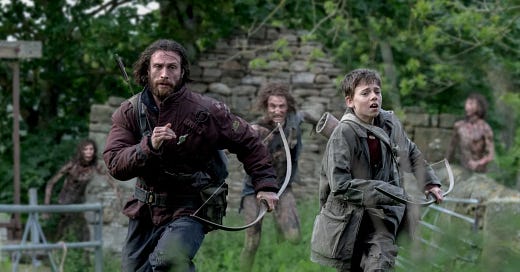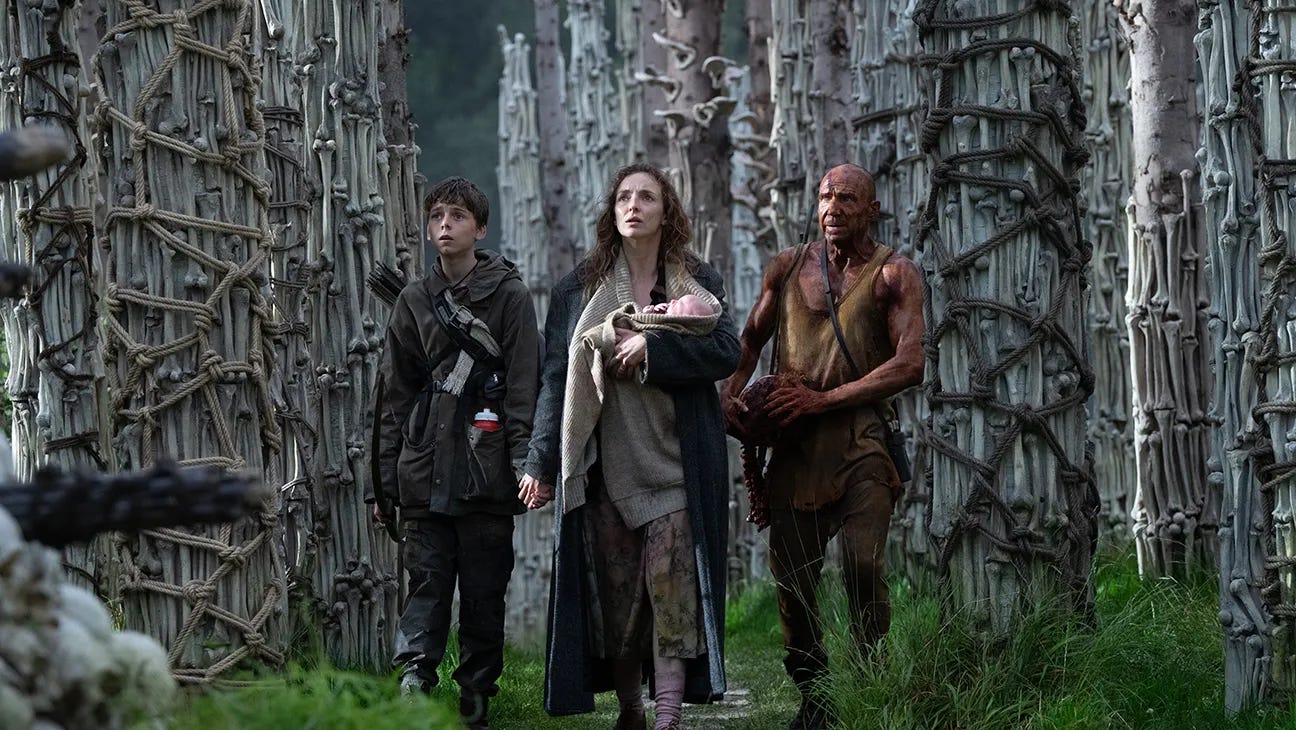There hasn’t been a post-apocalyptic zombie horror coming-of-age movie quite like 28 Years Later, maybe ever. (Contains spoilers)
There’s so much to be said about the brilliance of what 28 Years Later achieves. The movie never truly settles on one specific genre or scene. From the opening sequence, it begins a chain of themes and tones that the writer and director play with masterfully. What’s remarkable is that it doesn’t just introduce throwaway plotlines or themes; the story allows them to breathe, develop, and culminate in an emotional conclusion. The third act features bold and playful filmmaking that modern cinema needs more of. It both adheres to and defies conventional formulas, experimenting with new elements along the way.
Since there is so much to analyze about this film, for now, I will focus on sharing my initial thoughts and analyzing a few themes that I found particularly fascinating.
Initial Thoughts on 28 Days Later
Much like with many of my favorite movies, I didn’t think I was enjoying 28 Years Later until the third act. While I'm no expert in zombie films, I greatly enjoy the genre, especially when it’s done well. I appreciate how characters rediscover and explore new parts of themselves amidst the chaos of a life-threatening situation. It's fascinating to see how people can become closer and more humane during a zombie apocalypse than they have ever been before. Similar to the toughest challenges in our lives, such scenarios often reveal our truest aspects. When faced with the living dead, you really have to become alive.
I'm glad I didn’t pay much attention to the trailers. I loved 28 Days Later and enjoyed some aspects of 28 Weeks Later. The news that Danny Boyle would revive and continue the much-loved franchise was both exciting and a little scary. You can never be sure of a director's mindset at any given time, even when that director is a legend like Boyle. But I must say, Boyle is as skilled as he has ever been, perhaps even better. 28 Years Later combines a contemporary aesthetic with Boyle’s classic techniques and tricks, creating a remarkable zombie experience following Alex Garland's fantastic script.
The vision is so precise in 28 Years Later that all the doubts I had about most of the movie were cleared up in the third act. At times, I found myself frustrated that the film leaned a bit too heavily into spirituality, elevating the zombie creatures to unusually high levels. However, the ending brought everything to precisely the kind of storytelling I love. It wrapped up the story with a bang, setting the stage for a promising continuation that is sure to be a crazy, erratic, gory, and emotional experience.
The Post-Appocalyptic Zombie World
It's interesting to observe the contrast between the human race returning to basics and the evolutionary progress made by the zombie race. I'm not used to exploring that idea in this genre, but I love a challenge. I love the concept of zombies simply being zombies. Whether they are slow or fast, they are just simple creatures with one goal. I don’t expect or crave much evolution from them. However, I’m open to the idea that this can serve as a great tool for a post-apocalyptic story. It makes it harder for humans to quickly figure out how to eliminate or shield themselves from mindless zombies. For the first time in a long while, people must get genuinely uncomfortable and learn how to constantly adapt to the new versions of the infected creatures.
Grow Up Fast, Fight Hard
I think a huge theme of 28 Years Later is navigating father issues. Fathers are meant to be those magical figures—warriors and protectors—especially for little boys. The film opens with an apocalyptic outbreak, where a young boy, Jimmy, is the only survivor from a house overrun by zombies. After escaping the house, he instinctively seeks his father for protection. However, his father, a preacher, is so consumed by the religious meaning of the apocalypse that he leaves his son to fend for himself. In an instant, the boy is forced to grow up and decide whether to follow his father's path or to survive and carve out his own destiny.
For our main character, 12-year-old Spike (Alfie Williams), the zombie world is all he has ever known. He was born into it. Spike’s upbringing was primarily shaped by his father, Jamie, and their village, which imposed specific religions and rules. Jamie, played by Aaron Taylor-Johnson, is an authoritarian figure who values toughness of character and demands nothing less from his son. This may be the only aspect of his life he can control, as Jamie’s wife is dying from a disease he can't help her with, leading him to drown his sorrows in alcohol.
After a life-threatening venture beyond the village borders, Spike uncovers the harsh reality of his father's infidelity and his failure to care for the family. This shocking revelation dismantles the idealized image he had of Jamie. His father refuses to take the necessary steps to find help for Spike’s mother, Isla, portrayed by Jodie Comer. Faced with this betrayal, Spike loses the father figure he once depended on for guidance and realizes he must mature rapidly. He willingly steps into the most dangerous territories of the zombie world, driven by the knowledge that his mother is battling an even greater foe.
Ultimately, Spike takes Isla to see Dr. Ian Kelson, played by Ralph Fiennes. Dr. Kelson diagnoses Isla with aggressively spreading cancer. For Spike, this disease represents a far more formidable threat than zombies. He witnesses his mom to be a true, fearless warrior. Although Isla can fend off zombies literally in her sleep, she is powerless against this internal battle.
Throughout his journey, Spike learns that there are so many people to learn from besides his father. Meeting Dr. Kelson expands his understanding of how to view zombies and approach death. In the final act, Spike discovers his new unconventional tribe, led by Jimmy, who has carved out his own unique survival strategy in this chaotic world.
The pivotal question now is: will Spike choose to follow in Jimmy's footsteps, or will he forge a path that is entirely his own?







